#Zaheer Abbas
Explore tagged Tumblr posts
Text
Friends bonded by food and cricket: Former Pakistan captain Zaheer Abbas remembers Aunshuman Gaekwad
It was a 671-minute marathon and one of the slowest double centuries in Test cricket, but as Aunshuman Gaekwad built his innings and made the bowlers toil at the Burlton Park in Jalandhar, Pakistan captain Zaheer Abbas couldn’t help but admire the Indian opening batter’s ‘determination and sound technique’. In pursuit of Pakistan’s first innings total of 337, India was struggling at 73 for three…
0 notes
Text
QAUMI TARANAH!
NATIONAL ANTHEM OF THE ISLAMIC REPUBLIC OF PAKISTAN,
A UNIQUE ONE OF A KIND MUSLIM NATION OF 250 MILLION WARRIORS,
WHO ARE NOT AFRAID OF DEATH
The National Anthem of Pakistan,[a] also known by its incipit "The Sacred Land",[b] is the national anthem of the Islamic Republic of Pakistan and formerly the Dominion of Pakistan.[1] First composed by Ahmad G. Chagla in 1949, lyrics in the highly persianized Urdu were later written by Hafeez Jalandhari in 1952.
It was broadcast publicly for the first time on Radio Pakistan on 13 August 1954, sung by Jalandhari himself and officially adopted on 16 August 1954 by the Interior Ministry of the Government of Pakistan.
After officially being adopted,[2] it was recorded in the same year by eleven singers of Pakistan including Ahmad Rushdi.[3]
HISTORY: In early 1948, A. R. Ghani, a Muslim from South Africa's Transvaal, offered two prizes of five thousand rupees each for the poet and composer of a new national anthem for the newly independent state of Pakistan. The prizes were announced through a government press advertisement published in June 1948.
In December 1948, the Government of Pakistan established the National Anthem Committee (NAC) with the task of coming up with the composition and lyrics for the official national anthem of Pakistan. The NAC was initially chaired by the Information Secretary, Sheikh Muhammad Ikram, and its members included several politicians, poets and musicians, including Abdur Rab Nishtar, Ahmad G. Chagla and Hafeez Jalandhari.[citation needed] The NAC encountered early difficulties in finding suitable music and lyrics.[citation needed]
When President Sukarno of Indonesia became the first foreign head of state to visit Pakistan on 30 January 1950, there was no Pakistani national anthem to be played. In 1950, the impending state visit of the Shah of Iran added urgency to the matter and resulted in the government of Pakistan asking the NAC to submit a state anthem without further delay.
The NAC chairman, then Federal Minister for Education, Fazlur Rahman, asked several poets and composers to write lyrics but none of the submitted works were deemed suitable. The NAC also examined several different tunes and eventually selected the one presented by Ahmed G. Chagla and submitted it for formal approval.[4] On 21 August 1950, the Government of Pakistan adopted Chagla's tune for the national anthem.[5]
It was later played for Prime Minister Liaquat Ali Khan during his official visit to the United States on 3 May 1950. It was played before the NAC on 10 August 1950.[6] Official recognition to the national anthem, however, was not given until August 1954.[6] The NAC distributed records of the composed tune amongst prominent poets, who responded by writing and submitting several hundred songs for evaluation by the NAC. Eventually, the lyrics written by Hafeez Jalandhari were approved and the new national anthem was broadcast publicly for the first time on Radio Pakistan on 13 August 1954, sung by Hafeez Jalandhari himself.
Official approval was announced by the Ministry of Information and Broadcasting on 16 August 1954. The composer, Ahmed G. Chagla, died in 1953, before the new national anthem was officially adopted. In 1955, there was a performance of the national anthem involving 11 major singers of Pakistan, including Ahmad Rushdi, Kaukab Jahan, Rasheeda Begum, Najam Ara, Naseema Shaheen, Zawar Hussain, Akhtar Abbas, Ghulam Dastagir, Anwar Zaheer and Akhtar Wasi Ali.
In 2021, then Interior Minister Fawad Chaudhry announced that the national anthem will be re-recorded with better quality.[11] The project was completed in 2022 during Shehbaz Sharif’s tenure.[12] 155 singers, 48 musicians and 6 bandmasters participated in the re-recording, it was released on 14 August, 2022.[13][14]
MUSIC: The national anthem is a rendering of a three-stanza composition with a tune based on eastern music but arranged in such a manner that it can be easily played by foreign bands. The music, composed by the Pakistani musician and composer Ahmad G. Chagla in 1949, reflects his background in both eastern and western music. Typically twenty-one musical instruments[5] and thirty-eight different tones[5] are used to play the national anthem,[15] the duration of which is usually around 80 seconds.[2][5][16]
LYRICS:
The lyrics are in classical Urdu, written by the Pakistani Urdu-language poet Hafeez Jalandhari in 1952. No verse in the three stanzas is repeated.[2] The lyrics have heavy Persian poetic vocabulary,[17] and the only words derived from Sanskrit are "ka" (کا [kaˑ] 'of'), and "tu" (تُو [tuˑ] 'thou').[18]
URDU OFFICIAL:
Original text in Nastaliq script[10][19] Roman Urdu IPA transcription[c]
پاک سرزمین شاد باد
کشورِ حسین شاد باد
تُو نشانِ عزمِ عالی شان
ارضِ پاکستان!
مرکزِ یقین شاد باد
پاک سرزمین کا نظام
قُوَّتِ اُخوَّتِ عوام
قوم، ملک، سلطنت
پائندہ تابندہ باد!
شاد باد منزلِ مراد
پرچمِ ستارہ و ہِلال
رہبرِ ترقِّی و کمال
ترجمانِ ماضی، شانِ حال
جانِ استقبال!
سایۂ خدائے ذوالجلال
Pāk sarzamīn shād bād
Kishwar-e-hasīn shād bād
Tu nishān-e-azm-e-āli shān
Arz-e-Pākistān!
Markaz-e-yaqīn shād bād
Pāk sarzamīn ka nizām
Quwwat-e-ukhuwwat-e-awām
Qaum, mulk, saltanat
Pāyindah tābindah bād!
Shād bād manzil-e-murād
Parcam-e-sitārah-o-hilāl
Rahbar-e-taraqqi-o-kamāl
Tarjumān-e-māzi, shān-e-hāl
Jān-e-istiqbāl!
Sāyah-ye-khudā-ye-zūl-jalāl
[paːk səɾ.zə.miːn ʃaːd baːd ǀ]
[kɪʃ.ʋə.ɾ‿e‿hə.siːn ʃaːd baːd ǀ]
[tuː nɪ.ʃaː.n‿e‿əz.m‿e‿aː.liː‿ʃaːn]
[əɾ.z‿e‿paː.kɪs.taːn ǀ]
[məɾ.kə.z‿e‿jə.qiːn ʃaːd baːd ǁ]
[paːk səɾ.zə.miːn kaː nɪ.zaːm ǀ]
[qʊʋ.ʋə.t‿e‿ʊ.xʊʋ.ʋə.t‿e‿ə.ʋaːm ǀ]
[qɔːm ǀ mʊlk ǀ səl.tə.nət]
[paː.(j)ɪn.daː taː.bɪn.daː baːd ǀ]
[ʃaːd baːd mən.zɪ.l‿e‿mʊ.ɾaːd ǁ]
[pəɾ.t͡ʃə.m‿e‿sɪ.taː.ɾaː‿oː‿hɪ.laːl ǀ]
[rɛɦ.bə.ɾ‿e‿tə.ɾəq.qiː‿oː‿kə.maːl ǀ]
[təɾ.d͡ʒʊ.maː.n‿e‿maː.ziː ʃaː.n‿e‿haːl]
[d͡ʒaː.n‿e‿ɪs.təq.baːl ǀ]
[saː.jaː.(j)e‿xʊ.daː.(j)e‿zʊː‿l.d͡ʒə.laːl ǁ]
0 notes
Text
"Ego edition or too shy ...": Pakistan the Great brings a sharp verdict to Babar Azama
Karach: The legendary Pakistani cricket Zaheer Abbas believes that Babar Azam or Egoist is or too shy, seek the advice of former players, who may help him return to the formation of technical disadvantages in his shot. Zaheer, who has achieved 100 centuries of first class in his career, said Babar was supposed to sit down and talk to his seniors. “I think either Babar has a problem of ego or too…
0 notes
Text
Pak court allows Imran Khan to undergo medical examination
Islamabad: A Pakistani court Tuesday approved two petitions filed by jailed former premier Imran Khan, granting him the right to undergo a medical check-up and to speak with his children living in the UK. Islamabad-based Special Court Judge Shah Rukh Arjumand approved both of Khan’s requests in the presence of his lawyers, Usman Riaz Gill and Zaheer Abbas. Advocate Gill argued that although a…
0 notes
Text
Imran files two separate petitions in court
An undated image of PTI founder Imran Khan. — AFP/File ISLAMABAD: Two separate petitions were filed by the founder of PTI Imran Khan in the court of the Special Judge Central. The petitions, filed through lawyers Zaheer Abbas and Khalid Yousuf Chaudhry, requested that the children be ordered to be talked to him on a weekly basis. The jail authorities did not implement the court’s first order…
0 notes
Text
[ad_1] Zaheer Abbas and Virat Kohli (Image: X) In 1989, during India’s tour of Pakistan, a distraught Mohammad Azharuddin had turned to Zaheer Abbas for advice. He was going through an elongated lean patch and was on the verge of losing his place in the Indian team. Zaheer told Azhar to change his grip and it changed the course of the latter’s career. After failing in the first Test in Karachi, Azhar bounced back with a match-saving 109 in the second Test in Faisalabad. He returned from the series with 312 runs in four Tests, including a hundred and two half-centuries. Cut to 2024, and from a distance Zaheer has a piece of advice for Virat Kohli – “concentrate harder”. The legendary former Pakistan batsman refused to believe that Kohli’s career has entered the twilight zone and he backed the former India captain to regain his mojo in Australia. “Kohli doesn’t have any technical problem, just that he needs to concentrate harder,” Zaheer said, speaking to RevSportz. “When you are playing almost non-stop cricket, your mind can become jaded and you tend to lose concentration while batting. I think this is Kohli’s problem at the moment. He needs to be in the right frame of mind. He still has a few years of cricket left in him.” Somehow it feels like Kohli no longer remains the batsman he used to be. Over the last two years, he has scored 1,186 runs in 20 Tests at an average of 35.93. In the recently concluded Test series against New Zealand that India lost 3-0, Kohli made just 93 runs in six innings at an average of 15.50. His career average, which was above 55 at one stage, has now slid to 47.83. Against this backdrop, he is going to Australia for a five-Test series. Maybe, there’s no further room for a slip-up. “I back Kohli to score runs on true Australian pitches,” said Zaheer. “He would enjoy batting there. The ball will come on to the bat. There will not be much lateral movement, and he is a great player. If he can get into the right frame of mind, he should score a lot of runs.” A change of scenery could help, and Kohli has always enjoyed batting in Australia. In 13 Tests Down Under, he has 1,352 at an average of 54.08, including six hundreds. Meanwhile, the ex-Pakistan skipper chose not to read too much into Kohli’s travails against spin in the New Zealand series. “Batting sometimes can become a lottery on rank turners,” said Zaheer. “Anytime a ball might come with your name on it. Such pitches can make even average spinners look like world-class bowlers. I don’t think Kohli has any technical issues against spin. That said, he hasn’t been scoring runs for a while now and he has to get back to form in Australia. A lot will depend on how performs in the series.” India’s T20-style batting approach in Test cricket under Gautam Gambhir has become a cause celebre. Rewind to Kohli’s dismissal in the first innings of the second Test in Pune. A full-toss from Mitchell Santner went under the bat, as the star batsman tried to play it across the line. Ten times out of ten, Kohli would have put the delivery away if he were playing with a straight bat. It was clear that he was trying to innovate to be in sync with the team’s newly-adopted philosophy. It had happened to Joe Root as well, as he tried to adjust to the demands of Bazball. Several times he got out trying to manufacture shots – an attempted reverse-lap against Jasprit Bumrah earlier this year was a case in point. Returning to his natural game has reaped rich dividends for the England great. “Kohli must play his natural game,” said Zaheer. The post Kohli has cricket left in him, needs to concentrate harder: Zaheer Abbas appeared first on Sports News Portal | Latest Sports Articles | Revsports. [ad_2] Source link
0 notes
Text
[ad_1] Zaheer Abbas and Virat Kohli (Image: X) In 1989, during India’s tour of Pakistan, a distraught Mohammad Azharuddin had turned to Zaheer Abbas for advice. He was going through an elongated lean patch and was on the verge of losing his place in the Indian team. Zaheer told Azhar to change his grip and it changed the course of the latter’s career. After failing in the first Test in Karachi, Azhar bounced back with a match-saving 109 in the second Test in Faisalabad. He returned from the series with 312 runs in four Tests, including a hundred and two half-centuries. Cut to 2024, and from a distance Zaheer has a piece of advice for Virat Kohli – “concentrate harder”. The legendary former Pakistan batsman refused to believe that Kohli’s career has entered the twilight zone and he backed the former India captain to regain his mojo in Australia. “Kohli doesn’t have any technical problem, just that he needs to concentrate harder,” Zaheer said, speaking to RevSportz. “When you are playing almost non-stop cricket, your mind can become jaded and you tend to lose concentration while batting. I think this is Kohli’s problem at the moment. He needs to be in the right frame of mind. He still has a few years of cricket left in him.” Somehow it feels like Kohli no longer remains the batsman he used to be. Over the last two years, he has scored 1,186 runs in 20 Tests at an average of 35.93. In the recently concluded Test series against New Zealand that India lost 3-0, Kohli made just 93 runs in six innings at an average of 15.50. His career average, which was above 55 at one stage, has now slid to 47.83. Against this backdrop, he is going to Australia for a five-Test series. Maybe, there’s no further room for a slip-up. “I back Kohli to score runs on true Australian pitches,” said Zaheer. “He would enjoy batting there. The ball will come on to the bat. There will not be much lateral movement, and he is a great player. If he can get into the right frame of mind, he should score a lot of runs.” A change of scenery could help, and Kohli has always enjoyed batting in Australia. In 13 Tests Down Under, he has 1,352 at an average of 54.08, including six hundreds. Meanwhile, the ex-Pakistan skipper chose not to read too much into Kohli’s travails against spin in the New Zealand series. “Batting sometimes can become a lottery on rank turners,” said Zaheer. “Anytime a ball might come with your name on it. Such pitches can make even average spinners look like world-class bowlers. I don’t think Kohli has any technical issues against spin. That said, he hasn’t been scoring runs for a while now and he has to get back to form in Australia. A lot will depend on how performs in the series.” India’s T20-style batting approach in Test cricket under Gautam Gambhir has become a cause celebre. Rewind to Kohli’s dismissal in the first innings of the second Test in Pune. A full-toss from Mitchell Santner went under the bat, as the star batsman tried to play it across the line. Ten times out of ten, Kohli would have put the delivery away if he were playing with a straight bat. It was clear that he was trying to innovate to be in sync with the team’s newly-adopted philosophy. It had happened to Joe Root as well, as he tried to adjust to the demands of Bazball. Several times he got out trying to manufacture shots – an attempted reverse-lap against Jasprit Bumrah earlier this year was a case in point. Returning to his natural game has reaped rich dividends for the England great. “Kohli must play his natural game,” said Zaheer. The post Kohli has cricket left in him, needs to concentrate harder: Zaheer Abbas appeared first on Sports News Portal | Latest Sports Articles | Revsports. [ad_2] Source link
0 notes
Text
Babar Azam ko Team se Baahar kar Dena Chaahiye: Zaheer Abbas
नई दिल्ली। पाकिस्तान क्रिकेट टीम और उसके पूर्व कप्तान बाबर आजम इन दिनों आलोचनाओं का शिकार हो रहे हैं। इसकी वजह है उनका फ्लॉप शो, जो लंबे समय से हर फॉर्मेट में उनका पीछा नहीं छोड़ रहा।
आईसीसी इवेंट से लेकर हर फॉर्मेट में पाकिस्तान क्रिकेट टीम का हाल बहुत खराब है। विदेशी जमीन ही नहीं, इस टीम को अपने घरेलू मैदान पर भी शर्मनाक हार झेलनी पड़ी। बांग्लादेश के खिलाफ टेस्ट सीरीज हारने के बाद पाकिस्तान क्रिकेट में उथल-पुथल मची हुई है।
Read More: https://www.deshbandhu.co.in/news/babar-azam-should-be-dropped-from-the-team-zaheer-abbas-498459-1
0 notes
Link
In order to maintain the natural beauty of Murree, the surrounding environment has to be kept clean, - ...
0 notes
Text
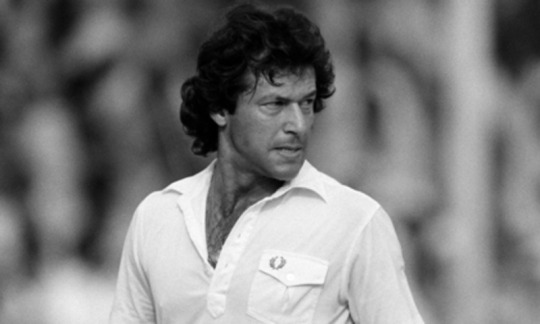
IMRAN KHAN AS 'KAPTAAN'
The decision to make Imran Khan the captain of the Pakistan cricket team in 1982 took a lot of people by surprise.
Known more as a flamboyant fast-bowler/bowling all-rounder and ‘playboy,’ nobody quite expected him to ever lead the national cricket team. Not even Imran himself.
When Javed Miandad was ousted by a players’ rebellion, he was expected to be replaced by either Zaheer Abbas or Majid Khan.
But since Majid and Zaheer were the central figures in the rebellion against him, Miandad (after resigning from the captaincy), made it clear to the cricket board that he was not willing to play under either of the two aspirants.
The board came up with a compromise candidate in the shape of Imran Khan. Khan was reluctant. His close friends warned him that captaincy would destroy his career and form.
Nevertheless, after some thought, Khan accepted. Quite the opposite happened to his career and form. Not only did he win 7 of the first 12 Tests that he captained, his form as all-rounder also reached a peak.
With his performances he was able to quickly gain the respect of his teammates and successfully weave a fragmented side into a tightly-knit unit. However, in 1983 he suffered a career-threatening stress fracture in one of his shins that prevented him from bowling.
He tried to hang on as a batsman and captain, but couldn’t help arrest the team’s sudden decline. He finally decided to take a break from the game and heal his fracture.
When he returned to the team in 1985, Miandad was once again the captain but he voluntarily handed over the captaincy to Khan.
Khan’s second stint as skipper was equally successful but at the same time a lot more controversial.
After reestablishing himself in the team as its premier all-rounder and captain, Khan began to exercise an almost dictatorial hold over the team and regularly clashed with the selectors and members of the board.
He claimed that since it was the captain’s head that lands on the chopping block when the team does not do well, the captain should have the most say in selecting the team.

Khan would often throw away and reject touring squads selected by the selectors, and refuse to play if his recommendations were not entertained in selection matters. This attitude bore both fruit and frustration.
For example, he fought hard with the board to get in players like Abdul Qadir (who would go on to become a world-class spinner). He also dotingly nurtured fast men like Wasim Akram, Waqar Younis and Aaqib Javed who went on to lead a fast-bowling revolution in Pakistan in the 1990s.
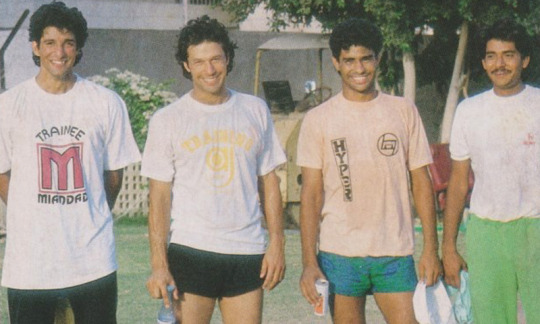
The board could not do much about Khan’s tantrums as long as he had the backing of the team, was performing well as a player, and producing unprecedented victories.
For example, it was under Imran that the team notched its first ever Test series wins against England (in England) and against India (in India) – both in 1987.
No player, except his vice-captain, Javed Miandad, dared disagree with him, and the selectors and board officials mostly did what he told them to.
He would also often exhibit his anger on the field at players he thought weren’t giving their all, and the spectacle of Khan admonishing players with some choice Urdu and English abuses became a common sight.

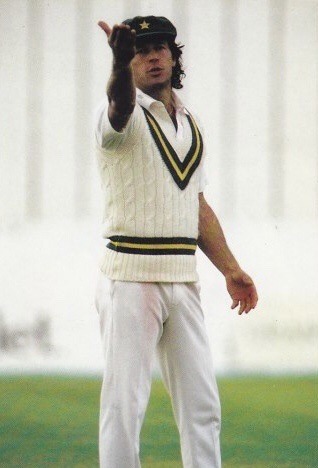
No wonder then that one of Khan’s heroes was former Australian captain, Ian Chappell. Like Chappell, Khan regularly applied tactics involving mind games.
For example, when he managed to bring back Abdul Qadir from oblivion for the team’s 1982 tour of England, he told the British press that there has never been a trickier leg-spinner than Qadir. He then asked Qadir to grow a ‘wizard’s goatee’ so he would look like a mysterious magician.
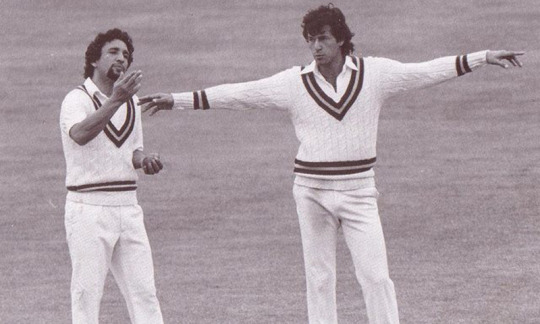
During an ODI tournament in Australia in 1986, Khan advertised all-rounder, Manzoor Elahi, as being ‘perhaps the hardest hitter of the cricket ball in the world.’ Of course, he wasn’t.
In 1989, while playing an international ODI tournament in India (that Pakistan won), Khan (to distract the Indian team), told the press that the issue of Kashmir should be resolved and settled (between India and Pakistan), on the cricket field!
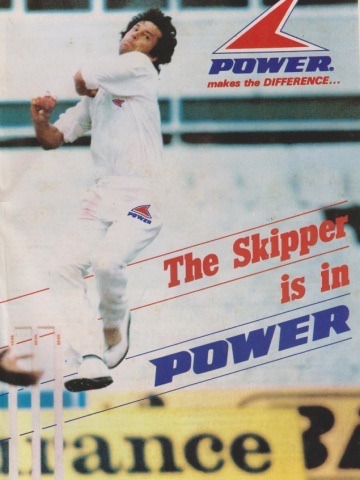

Players found him to be uncompromising and stern on the field, but also remember his captaincy to be a ‘very fun period’ in their careers.
Khan finally wrapped up his career by leading Pakistan to win the 1992 World Cup in which his vice-captain, Javed Miandad, and he played pivotal roles.
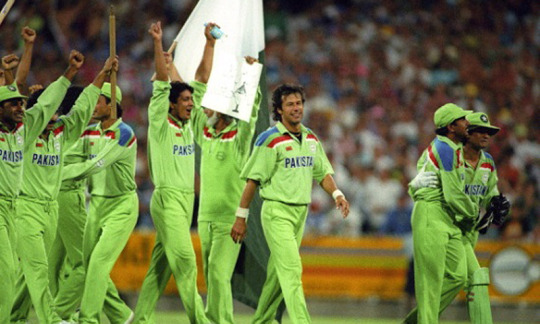
Imran retired immediately after the World Cup, aged 41.
Captaincy Record (1982-84/1986-88/1989-92):
Tests: 14 won, 8 lost, 26 drawn.
ODIs: 75 won, 59 lost, 1 tied, 4 no result.
0 notes
Text
From the archives: When Zaheer Abbas-led Pakistan walked off the field in Bengaluru as Gavaskar neared his 28th Test ton
England captain Ben Stokes, seeing the fourth Test at Manchester heading to a sure draw, decided to extend an invitation to draw the match to give his bowlers some added rest. India had Ravindra Jadeja and Washington Sundar on strike, both inching closer to their individual centuries. The Indian management decided to hold off on accepting the draw to allow the duo to register their hundreds,…
0 notes
Text
NATIONAL ANTHEM OF PAKISTAN
Qaumee Taraanah of Pakistan
Qaumī Tarāna (Urdu: قومی ترانہ) is the national anthem of Pakistan. Lyrics by Hafeez Jullundhri. Music by Akbar Mohammed. Adopted in 1954.
The National Anthem of Pakistan, also known by its incipit "The Sacred Land", is the national anthem of the Islamic Republic of Pakistan and formerly the Dominion of Pakistan. First composed by Ahmad G. Chagla in 1949, lyrics in Persified Urdu were later written by Hafeez Jalandhari in 1952. It was broadcast publicly for the first time on Radio Pakistan on 13 August 1954, sung by Jalandhari himself and officially adopted on 16 August 1954 by the Interior Ministry of the Government of Pakistan.
After officially being adopted, it was recorded in the same year by eleven major singers of Pakistan including Ahmad Rushdi, Kaukab Jahan, Rasheeda Begum, Najam Ara, Naseema Shaheen, Zawar Hussain, Akhtar Abbas, Ghulam Dastagir, Anwar Zaheer, and Akhtar Wasi Ali.
Pakistan as it exists today is one of the world’s youngest, yet most populous countries. Situated in South Asia and bordering India, Afghanistan, Iran and China, the land on which Pakistan sits as a modern state has a rich history and culture dating back at least eight and a half thousand years.
From 1858, Pakistan was part of the British Indian Empire, gaining independence in 1947 after the Pakistan Movement campaigned for a home for Muslims in British India. An official constitution followed in 1956, and in 1971 Bangladesh emerged as a new country from what had been East Pakistan.
Soon after Pakistan’s newfound independence, a search was launched for a piece of music to become the new country’s national anthem. The successful lyricist and composer would receive 5,000 rupees each, according to an ad published in June 1948.
Presumably, however, the search was unsuccessful, as in December of that year the National Anthem Committee (NAC) was set up by the Pakistani government, and tasked with the creation of an original national anthem.
Progress was slow, and by the time of the Indonesian President’s state visit to Pakistan in January 1950, the country remained without a national anthem. The government urged the NAC to procure a national anthem in time for the Shah of Iran’s visit later that year.
After a search far and wide, the NAC picked out a melody written by composer Ahmed G. Chagla, which was accepted on 21 August 1950 as the tune to Pakistan’s official national anthem.
For some time, the anthem was used in an instrumental version until suitable words could be found. The NAC sent recordings to some of the most prominent Pakistani poets, as a call-out for the anthem’s lyrics.
Several hundred songs were received in return, and the words of Hafeez Jalandhari were ultimately selected. The national anthem was broadcast with both words and music for the first time on 13 August 1954, on Radio Pakistan, sung by the lyricist himself.
What are the lyrics to Pakistan’s national anthem?
Hafeez Jalandhari wrote his lyrics in Urdu – the official language of Pakistan – but used words that are shared in the Persian language too, so that speakers of both languages are able to understand the anthem.
The lyrics in (Roman) Urdu, and their English translation are as follows:
Paak sarr zameen shaad baad
Kishwari haseen shaad baad
Too nishaani ‘azmi ‘aalee shaan
Arzi Paakistaan!
Markazi yaqeen shaad baad
Paak sarr zameen kaa nizaam
Quwwati ukhuwwati ‘awaam
Qaum, Mulk, Saltanat
Paayindah taabindah baad!
Shaad baad manzili muraad
Parchami sitaarah o hilaal
Rahbari taraqqee o kamaal
Tarjumaani maazee shaani haal
Jaani istaqbaal!
Saayahyi Khudaayi Zool-jalaal
English translation
Blessed be the sacred land,
Happy be the bounteous realm.
Thou symbol of high resolve,
O Land of Pakistan!
Blessed be the citadel of faith.
The order of this sacred land,
The might of the brotherhood of the people,
May the nation, the country, and the state,
Shine in glory everlasting!
Blessed be the goal of our ambition.
The flag of the crescent and star,
Leads the way to progress and perfection,
Interpreter of our past, glory of our present,
inspiration for our future!
Shade of God, the Glorious and Mighty.
REFERENCES:
0 notes
Text
With the compliments of, Directorate General Public Relations,
Government of the Punjab, 99201390.
No. 1206/Tayyab/Mujahid
HANDOUT (A)
IRANIAN CONSUL GENERAL MEHRAN MOWAHID FAR CALLS ON SHAFAY HUSSAIN
Lahore, May 2: The Iranian Consul General Mehran Mowahid Far met Provincial Minister for Industries and Commerce Chaudhry Shafay Hussain. During the meeting, discussions were held on increasing cooperation between Punjab and Iran in agriculture, livestock, solar energy, agricultural equipment and other sectors. Mutual exchange of trade delegations was agreed upon. The Iranian Consul General congratulated Chaudhry Shafay Hussain on assuming the portfolio of Minister for Industries and Trade.
Provincial Minister for Industries and Commerce Chaudhry Shafay Hussain said that there is a wide scope for increasing cooperation between Punjab and Iran in various fields. The Provincial Minister for Industries and Commerce said that we want solar panels manufacturing factories to be set up in Punjab. Solar panels are being built in Iran and cooperation between the two countries can be increased in the manufacturing of solar panels. Chaudhry Shafay Hussain said that there is a wide scope for investment in various sectors of Punjab and there is also a favourable environment for investment. He said that he was happy to see the modern infrastructure during his visit to Iran.
The Iranian Consul General said that there is a strong relationship of friendship between Iran and Pakistan, 3 cooperation agreements and 5 Memorandums of Understanding (MOUs) were signed during the visit of the Iranian President. He said that the Punjab government is dynamic and has the passion to work for the well-being of people.
The Iranian Consul General said that both countries have the ability to meet each other needs. Punjab is ready to increase cooperation with the government in every field. CEO Punjab Investment Board Jalal Hasan, Member Punjab Assembly Chaudhry Ijaz Ahmed and the representatives of the business community Asad Waraich, Numan Sheikh, Faisal Warraich, Zaheer Abbas and others were also present.
** **
0 notes
Text
Mushtaq Mohammad, Inzamam, Misbah, Saeed Anwar inducted into PCB Hall of Fame
Lahore: The Pakistan Cricket Board (PCB) has inducted four former captains into its Hall of Fame for the year 2024 including Mushtaq Mohammad, Inzamam-ul-Haq, Misbah-ul-Haq and Saeed Anwar. While Mushtaq led Pakistan in the 1970s with big names like Imran Khan, Sarfaraz Nawaz, Asif Iqbal Majid Khan, Zaheer Abbas and Wasim Bari playing under his captaincy, Inzamam and Misbah were in charge for…
0 notes
